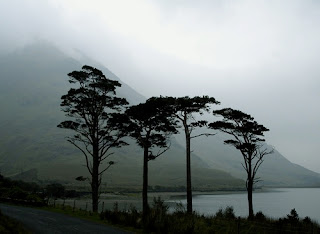

Wittgenstein in Rosroe, 1948, sketching a figure in the mud with a stick. It is a duck’s head and bill, or rather a rabbit’s head and ears, or rather both at once. St Roc’s nearby chapel and holy well, by a deep glacial notch in the hillside at the head of Killary Bay. Here St Roc struggled with the devil, according to legend. The devil attempts to drag the saint off to hell on a chain, the saint resists, and their struggles cut the pass into the hillside. ‘Thus geology reveals itself as mythology’, Tim Robinson observes in the preface to Connemara: The Last Pool of Darkness; ‘both are systems of “description of what can be seen” in terms of what lies too deep to be seen. (...) In some future legendary reconstitution of the past it will be Wittgenstein’s wrestling with the demons of philosophy that tears the landscape of Connemara.’
It’s always a pleasure to throw some hyperbole around, so let me hail this book now as the work of, I would say, the single most impressive prose writer in Ireland today. It is a truly awesome tome.
Assuming as I do that eccentric millionaire philanthropists form a large portion of my readership, let me put on record that if all my cat food/cappuccino/Beckett first edition needs could be taken care of for the next five or ten years, there is nothing I would rather do than spend the time tramping every last square yard of County Wicklow attempting to do for that tract of land something vaguely akin to what Robinson has done for the Aran Islands and Connemara.
Wittgestein’s stay in Connemara is by now a more or less officially mandated subject for Irish poetry, though of course he stayed in Redcross, Wicklow too, subsisting largely on a diet of charcoal biscuits and walking to the shops in Arklow when his stocks ran low. As he wrote to his sister Helene:
The country here would not have so many attractions for me if the colours here were not often so wonderful. I think it must be to do with the atmosphere, for not only the grass, but also the sky, the sea and even everything that is brown are all magnificent – I feel a good deal better here than in Cambridge.
{Ends}
First photograph shows Killary harbour (Ireland’s only fjord), the second the ‘motte stone’ in Redcross. This latter I have most fond memories of climbing. Photos found here and here.






































